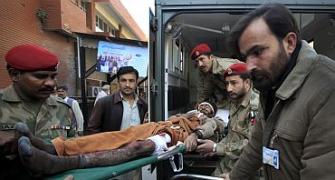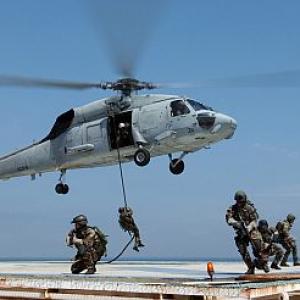The 18-hour standoff between Pakistani security forces and handful of militants at the Karachi naval air base has revived fears about militant infiltration in the country's military and the safety of its nuclear warheads.
The precision with which the small band of terrorists targeted the key base and destroyed two surveillance aircraft worth millions of dollars has also raised questions about whether insiders were involved in the attack.
The prolonged standoff at the air base has caused tremendous embarrassment for the powerful military establishment, coming as it did less than a month after the May 2 US raid in Abbottabad that killed Osama bin Laden.
The banned Pakistani Taliban claimed responsibility for the attack, saying it was carried out to avenge the al-Qaida leader's killing.
"The navy was vulnerable because there is penetration in both the navy and air force. The penetration in the navy is an old story that people don't want to talk about," Ayesha Siddiqa, a defence expert who once served as a civilian analyst with the Pakistan Navy, told the 'Dawn' newspaper.
Her comments come as experts pointed to the involvement of over 50 low-ranking air force personnel in botched attempts on the life of former President Pervez Musharraf and said there was a possibility that someone within the naval airbase helped the attackers.
Another noted defence analyst Lt Gen (retired) Talat Masood said, the possibility that the terrorists were helped by insiders is something that could not be ruled out.
"There is quite a possibility and an investigation will uncover the truth. But the attackers seem to have planned things out and knew a lot about the base," he told PTI.
Though nearly 1,500 security personnel, including naval and army commandos, were deployed to flush out the terrorists, Interior Minister Rehman Malik acknowledged that at least two attackers had escaped. Even the method of entry of the terrorists they approached PNS Mehran from an empty piece of land at the rear of the airbase, climbed over a security wall near Malir river using ladders and got into the facility through a blind spot between two surveillance cameras suggested that they had inside information, experts said.
Once inside, the attackers focussed on the hangars housing the P3C Orion aircraft, two of which were provided to Pakistan by the US last year.
The terrorist raid, which came less than two years after a 22-hour siege by militants of the army's General Headquarters in Rawalpindi, has thrown up "embarrassing questions across the world about the military's capability to safeguard the country's defence assets," the paper said.
Since the killing of bin Laden, the Taliban have
claimed responsibility for three major attacks one by two suicide bombers that killed nearly 90 people, most of them paramilitary recruits, at Shabqadar, a car bombing on a US consulate vehicle convoy in Peshawar and the assault on PNS Mehran.
"Such attacks are highly embarrassing and cannot be taken lightly. The terrorists are desperate and they want to challenge and demoralise the security forces," said defence analyst Masood.
"Questions are also being raised about loose security, especially with people asking why we can't defend our military facilities when we spend such an enormous amount on defence," he said.
More significantly, attacks like the one on PNS Mehran raised the issue of the "nature of the threat changing to one that is internal," Masood said.
"The whole internal security structure needs to be revamped and revisited. There is a need for an adjustment," he said. For decades, Pakistan's powerful army has trained for war or a standoff with India and experts say it is still grappling with the challenge of coping with the internal security threats posed by militant groups, some of which, like the Lashkar-e-Tayiba, have long-standing ties with the security and intelligence set-up.







